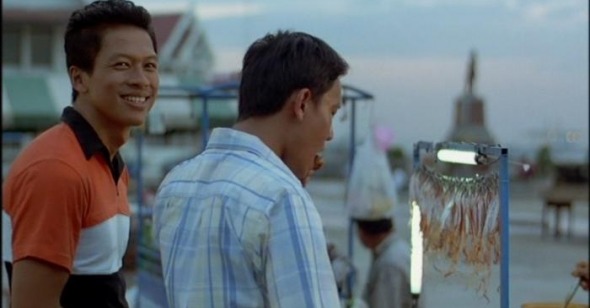Jungle to Jungle
by Michael Koresky
Tropical Malady
Dir. Apichatpong Weerasethakul, Thailand, Strand Releasing
Of all the transcendent moments I've had watching films this year-from Godard's opening ten-minute, found-footage “Hell” sequence of Notre musique, to M. Night Shyamalan's early dawn porch-side confession of budding love in The Village, to the final emergence in the hotel room of mankind's terrifying id in Bruno Dumont's Twentynine Palms—none quite literally took my breath away like the centerpiece of Apichatpong Weerasethakul's Tropical Malady. The film is cleaved in two, yet it doesn't really consist of two separate narratives; the two feed off of each other like succubi, transforming our everyday realities into the stuff of myth and back again. The relatively straightforward, slightly neorealist love story of the first half suddenly segues sharply into the meditative Buddhist fable of the second. The break between the two stories is achieved through an almost literal rupture in the film, a quite jarring zap. The large, festival-sized audience was left in darkness for what must have been no longer than 30 seconds but what must have seemed like much longer, for they were growing restless, even craning their heads back toward the projector to try and locate the cause of the apparent malfunction. But just as the audience started to clamor, the screen slowly, silently began to brighten, gradually revealing what appeared to be something like a cave drawing of a tiger. The film was alive and well after all; Apichatpong had brought us to the point of confusion and instability, then he drew us back in with a contemplative sigh.
All that comes before and after that moment of revelation, this forthright banishment of the narrative and reliance on purely emotional technique, is equally exquisite. Tropical Malady, even more than the Thai director's wonderfully opaque and complexly mundane previous film Blissfully Yours, relies heavily on emotional signification rather than theoretical distancing, certainly a rarity for a filmmaker whose works so often approach avant-garde. A common word used to describe Tropical Malady after its premiere at the 2004 Cannes Film Festival was “inscrutable,” an easy escape route out of the film's mythic plunge. However, I cannot think of a recent film as clear-eyed and appealingly lucid as this one: elemental in its regard towards love, primitive in its tactical mythmaking, ennobling in its uncompromised simplicity. Following the initially tentative and eventually rabidly passionate love affair between soldier Keng and manual laborer Tong in a rural Thai village, Weerasethakul nearly decimates all forms of conventional romance narrative. Reminiscent of Mulholland Drive in the way that its emotionally engaging characters ultimately metamorphose into walking metaphors for fundamental human passions and essential truths, Tropical Malady imbues its every moment with something simultaneously universal and culturally specific. That its deep, thick forest of tangled vines and articulate primates couldn't be any less alienating is Apichatpong's miracle.
The quiet of the jungle is nearly overwhelming; for long passages of the film, we're treated to nothing more than the sound of crickets, the images of branches swinging, the rustle of leaves, the nearly indecipherable silhouette of a man searching for his transformed animal lover in the richest, pitchest black of night. If we take love itself to be the tropical malady of the title, then it is here, in the unearthly silence of the forest, that the sickness becomes so all-enveloping. Terrified of infestation, the tiger, a feral personification of man's heart's desires, leaps off into the dense night, leaving his soldier lover bereft. For the remainder of the film, there is no separation between the natural and the otherworldly; when a single firefly drifts across the screen, in long shot, towards a gloriously moon-lit gargantuan tree swaying in the breeze, upon contact it seems to light the entire trunk and branches with a lovely inner glow. Here, the director achieves something essential to folk-telling that cinema rarely is able to replicate; through his composure, Weerasethakul creates a visual bedtime story, a soft lullaby.
While many try to decipher the seeming cultural specificity of its primal fable, they are at once ignoring the film's tender and direct address. It's a film about nature: human and animal, both equally part of the landscape's tall grasses, overgrown thickets, and impenetrable jungles. Avant-gardist Robert Beavers, one with the soil as much as with his Steenbeck, is here, but so is Louis Malle (The Lovers' midnight boat ride to some sort of celestial eroticism, only visible by moonlight is doubled in the breathtaking nighttime photography of the film's second half). How can a film so widely acknowledged as being stubbornly obscure make such a heartfelt, clear-eyed impression? The first half, in which the two young men tenuously connect with one another, their mutual attraction gradually revealing itself in tiny physical gestures, remains utterly blissful, universal, and gently sexy; the second half, after that narrative-demolishing zap-out midpoint, like Mulholland Drive, reframes the action of the first by distilling its contents down to a primordial plane. The two narratives could even be seen as horizontal lines that never quite meet yet each one informing the other of a truth it could never possibly articulate. Settling into the more mystical, visually entrancing folk legend, with its mysterious shaman, its tale of hunter and hunted, its talking animals, requires a leap of faith. But then again, so does all mythology; the trick is in applying it to our current state of being. Apichatpong's visual splendor doesn't just cohere his disparate strands, it unites audience with myth, religion, and love. Like 2004's other profound onscreen love stories, Tropical Malady uses minimal situations to stand in for grandiose treatises on the nature of love itself. Less site-specific than all encompassing: Whereas Eternal Sunshine of the Spotless Mind played with the fragility of memory and Before Sunset with time, here we see the tangles of primitive and modern spirituality, the inability to separate the two, and the attempt to create a harmony.
